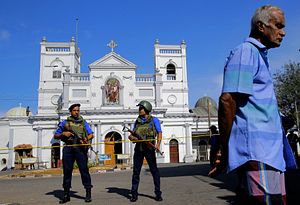With less than a month to go before the 10th anniversary of the end of the Sri Lankan Civil War, the country is in mourning. On Easter Sunday, a series of coordinated explosions occurred on both sides of the South Asian island state — in churches and luxury hotels in the capital city of Colombo and the cities of Negombo and Batticaloa. By Monday, the death toll stood at nearly 300 killed, with almost another 500 injured.
The death toll places the Sri Lankan Easter attacks high on the list of global terrorist attacks in recent years. The toll could have been higher than it was, too: a Sri Lankan military spokesman announced on Monday that another explosive device — what appeared to be a “homemade” pipe bomb — was located and disabled on a road near Colombo’s major international airport.
One day after the attack, attribution remains unclear. No group has come forward to claim the attack, which has in the meantime allowed for rampant speculation in Sri Lanka and the region about possible perpetrators. Given Sri Lanka’s still-raw ethno-religious fault-lines, the government moved to block popular social media platforms Facebook, WhatsApp, and Instagram, with the objective of stemming the spread of misinformation.
Speaking to the country on Sunday, Sri Lankan Prime Minister Ranil Wickremsinghe made clear that authorities had received intelligence about the Easter Sunday attacks, which were obviously a well-coordinated and sophisticated operation. However, he added that he and other top Sri Lankan government officials were not informed.
“We must look into why adequate precautions were not taken,” he said. “Neither I nor the Ministers were kept informed,” he added, continuing that “for now the priority is to apprehend the attackers.” Sri Lankan Minister of National Integration Mano Ganesan had said on Twitter before Wickremsinghe’s remarks that “Ministerial Security Division (MSD) officers had been warned by their Division on two suspected suicide bombers in Colombo targeting politicians” a week before the attacks.
So far, Sri Lankan authorities have made multiple arrests in connection to the attacks. Given their coordinated nature, the high death toll, and the specific targeting of Christians on Easter Sunday, the attacks have drawn widespread support for Sri Lanka from all corners of the world. Apart from Sri Lankan victims, citizens of the United Kingdom, the United States, India, China, Turkey, Portugal, Bangladesh, Japan, and Denmark were killed in the attacks.
“We stand with the Sri Lankan government and people as they confront violent extremism and have offered our assistance as they work to bring the perpetrators to justice,” U.S. Secretary of State Mike Pompeo said in a statement. Indian Prime Minister Narendra Modi strongly condemned the attacks and added that there was “no place for such barbarism in our region.” India has historically been a close security partner for Sri Lanka.
The perpetrators of the attack remain unclear and there isn’t a recent precedent for these kinds of attacks in the past few years in Sri Lanka. Suicide bombings were a tactic used by the Tamil separatists during the country’s 25-year-long civil war. Since the end of the war, tensions have persisted between Sri Lanka’s predominantly Buddhist Sinhalese majority and Tamil minority. The country’s Tamil-speaking population comprises Hindus, Christians, and Muslims. In recent years, the Muslim minority in particular has seen persecution at the hands of hardline Sinhala Buddhist groups.
What sets apart the Easter Sunday attacks from the smaller-scale political violence that has persisted in Sri Lanka since the end of the Civil War is not only the sophistication of the coordinated bombings, but the choice of targets. Targeting Roman Catholic worshippers on Easter Sunday as well as foreigner-heavy luxury hotels hearkens to the targeting preferred by global extremist groups like al-Qaeda and the Islamic State. Both groups have been quick to claim attacks in the past and neither has done so following Sunday’s attack. The choice of luxury hotels in particular is also reminiscent of the November 2008 attacks on the Indian city of Mumbai, carried out by gunmen belonging to the Pakistan-based terrorist organization Lashkar-e-Taiba.
One domestic group that has come under scrutiny is National Thowheeth Jama’ath, which was the subject of an official Sri Lankan police advisory as far as 10 days in advance of the attack. The group sees affinities with violent radical Islamists organizations globally, but had limited its activities within Sri Lanka to harassment and vandalism targeting primarily Buddhists. The group’s secretary, Abdul Razik, was arrested in November 2016 on the charge of inciting racism.
Even as questions persist about the perpetrators of the attacks, serious concerns remain about the prospect for these attacks further polarizing Sri Lanka. The country is still not far off from a major constitutional crisis between the current president, Maithripala Sirisena, and his prime minister, Wickremsinghe. As national elections loom later this year, the latter’s differences with the country’s former strongman president, Mahinda Rajapaksa, may widen in the aftermath of these attacks.

































